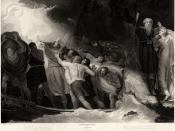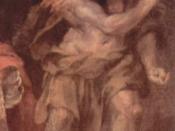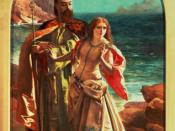Caliban
Through Prospero's verbal and physical abuse, the enslaved Caliban is unjustly portrayed as a vicious and subhuman beast. Prospero has no feelings for Caliban. Therefore he thinks that Caliban was put on earth for work. Additionally Prospero just thinks he makes fires and does work for him so people should not have sympathy for him. ' We cannot miss him. He does make our fire, Fetch in our wood, and serves in offices That profit us - What ho, slave, Caliban.' (Shakespeare 35) This shows that he is overworking Caliban and that he is just a piece of property. Also, Prospero thinks he is always moving slowly. When Caliban is first coming into the play, Prospero yells 'Come forth, I say. There's other business for thee. Come, thou tortoise. When?' ( 35) This a prime example of Prospero harassing Caliban because Prospero feels he is not working efficient enough.
In addition Prospero orally abuses him by saying rude things like, 'Thou poisonous slave, got by the devil himself Upon thy wicked dam, come forth!' (35) Prospero is scolding him saying he is evil. Prospero then goes on to call him, 'Thou most lying slave,' (37) because he accuses him of raping Miranda, Prospero's daughter. He then orders Caliban to get fire wood. He doesn't understand that Caliban has feelings. In conclusion, Prospero is depicting Caliban as a subhuman beast, someone he isn't.


